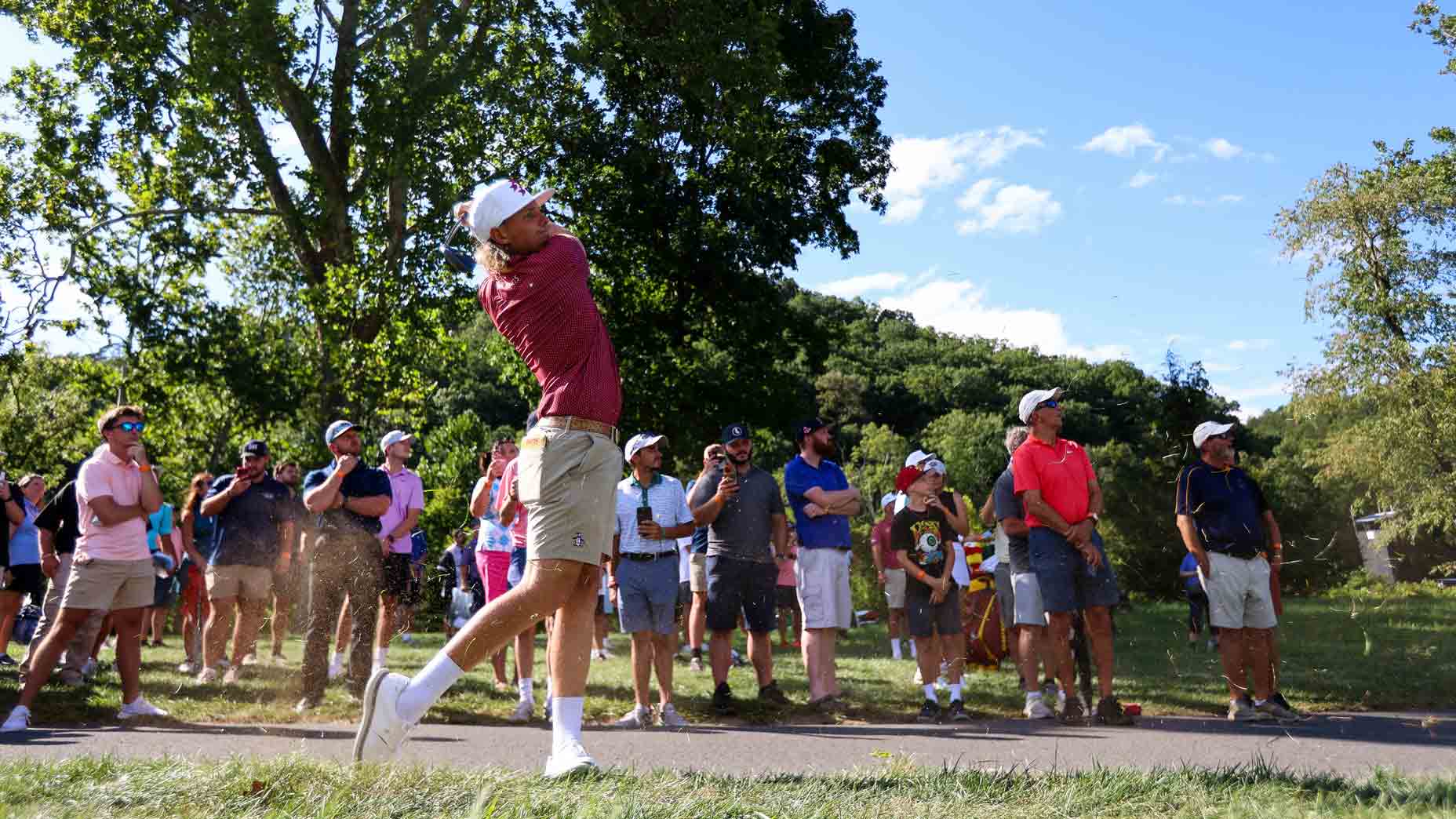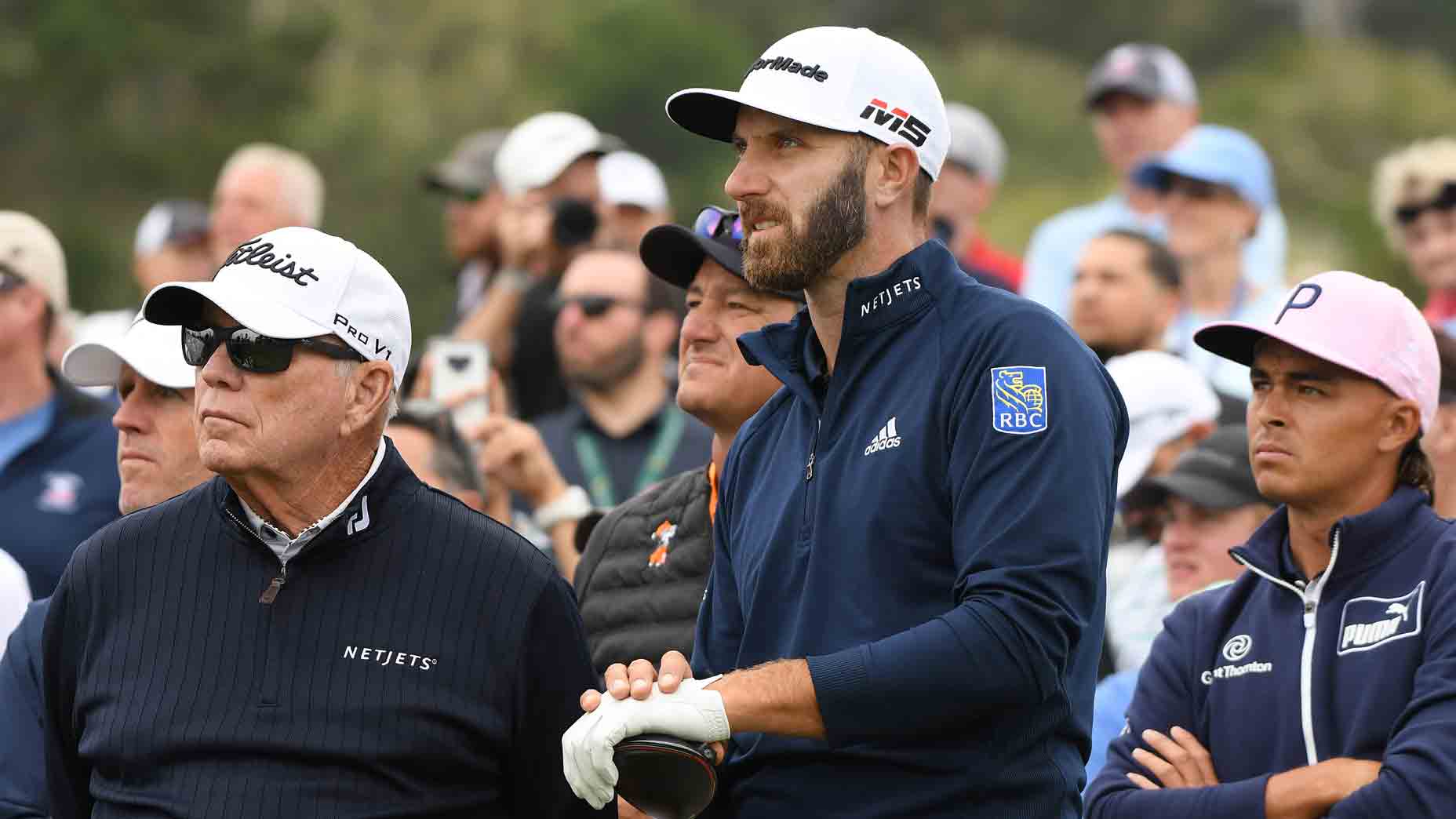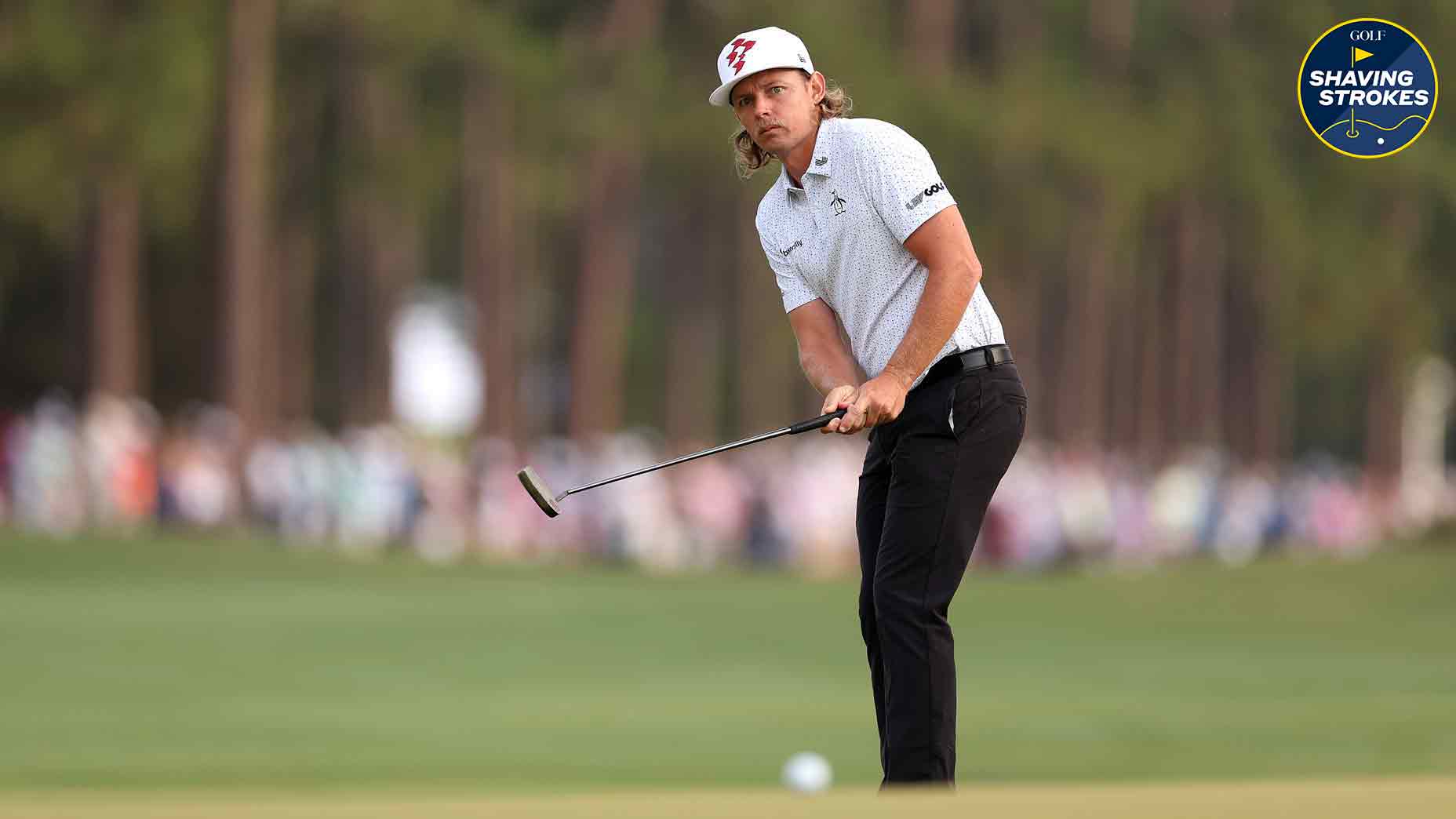Cam Smith hits a shot in August at LIV Golf’s event in West Virginia.
Getty Images
Pros are good at golf. That, of course, we know.
But how are they good at golf? What does it look like under the hood of their golf bag, so to speak?
That’s what Ryan Mouque wants to share. Mouque, a top teacher based out of Australia, wrote recently over his X social-media account that he spent a week inside the ropes with 2022 Open Championship winner Cam Smith at a LIV Golf event, where he said he saw the pros were, in a word, human. They had demons. They had poor-shot swing tendencies.
But …
“They are just better at it than all of us,” Mouque wrote.
He left with 11 takeaways that have gotten them there. You can read Mouque’s X thread by clicking here, or by scrolling below, where we’ll also offer additional thoughts. It’s here where we also recommend following Mouque on X, which you can do here, and Instagram, which you can do here.
1. ‘Putting stroke length’
“Cam has one of the best putting strokes you could ever ask for,” Mouque wrote. “If you watch the length of his backswing versus his through swing, you’ll notice the backswing is significantly longer and the through swing almost stops just after he has struck the ball.
“What he works on is ‘hitting the putt with the backswing.’ What this means is that to control distance, he changes just the length of the backswing. If he has a long putt, the backswing will increase in order to have enough energy to get the ball to the target without needing to hit the putt hard or have a really fast swing.”
Editor’s note: Good tempo, no matter the distance, is the payoff here.
2. ‘AimPoint’
“Cam uses AimPoint for his green reading,” Mouque wrote. “For someone like Cam, who can hit his intended start line nine out of 10 times, as long as he feels the correct slope percentage and has the right speed, that ball goes in.
“I’d advise you to learn the basics on AimPoint — it truely can help you. Don’t listen to those who say it takes too long — it doesn’t.”
Editor’s note: There’s a reason this is gaining in popularity (though Jim Nantz is not a fan). There’s no harm in experimenting with it.
3. ‘Systems’
“Cam has the same system for everything and doesn’t really change it up,” Mouque wrote. “His putting practice is always the same, his range sessions look the same. These players all take pride in doing the same thing over and over again, versus the average golfer who continuously changes what they are working on, how they are working on it, etc.
“Try sticking with the same thing over and over, and do it long enough to excel at it.”
Editor’s note: Don’t tinker just to tinker.
4. ‘Range vs. course’
“These players are just like everyone else,” Mouque wrote. “They all flush it on the driving range but do hit poor shots on the course from time to time.
“I saw Cam hit shots on the course that he would never hit on the driving range. There are not only technical reasons for this, but also situations and certain environments that bring that technique out.”
Editor’s note: The range can get you only so far.
5. ‘Intensity’
“I was fortunate enough to be able to walk the course with the Ripper GC team consisting of Cam Smith, Lucas Herbert, Matt Jones and Marc Leishman,” Mouque wrote. “On Tuesday during a practice round, it was very casual, laughing, having a good time while playing some money games.
“The following day was a little more serious. As they got closer to round one, the intensity started to increase, they would play a singles money game versus a team money game, they would make sure every putt had to be made.
“Thursday was pro-am day, where they played nine holes and had their last opportunity to dial in their targets and lines, and get a feel for how the course was playing. There was a more serious feel on Thursday versus Tuesday.”
Editor’s note: It should be interesting to read that there was time to breathe.
6. ‘Drills and technical work’
“Despite this being a tournament week, they absolutely still work on technique,” Mouque wrote. “They have training aids out there, coaches are taking video of swings, and the players are still working on their feels and movement patterns
“They aren’t ‘thinking of nothing,’ that’s for sure.”
Editor’s note: Make range time productive.
7. ‘They work hard’
“The narrative for these guys is that because they have been paid, they aren’t working that hard,” Mouque said. “I can assure you, they are working their tails off.
“All these guys are where they are because they are good at what they do. That was through years of hard work — that mindset and work ethic don’t just disappear because they get paid money up front like every other sport in the world.
“Brooks shot eight-under on day one and went straight to the range to dial in his ball striking after getting a bite to eat. Cam worked on his game for two hours after round one, as a few things were off in his putting and swing. They are working very hard.”
Editor’s note: This has been a much-discussed topic. Could LIV players relax? They could. But Mouque saw it differently.
8. ‘Elite distance control’
“At the end of one of Cam’s range sessions, we would all have a go at giving him a number to hit between 80 and 150 yards,” Mouque wrote. “Cam didn’t miss a number by more than 2 meters.
“For example, if I had said, hit it 132 meters (or yards), he would hit it within 2 meters of that number. It was VERY impressive. Some wedge numbers he was given he hit with 0 to 1 meter of the yardage. That’s how good these guys are when there is absolutely no pressure and no environmental factors.”
Editor’s note: Speaking of productive range time, give this game a go.
9. ‘Environment changes swing’
“Although these players are almost flawless on the range,” Mouque wrote, “they are not immune to hitting poor shots on the golf course, but we must ask ourselves: If they are perfect on the range, is it technique that’s the issue on course, or something else?
“You’ll find every player has a something in their swing that causes poor shots. This is often magnified when faced with certain winds, hazards on a certain side of the course, uncomfortable tee shots that don’t suit their eye, etc.
“Cam gets a hard time about his driving, but you just don’t know what winds and environments mess with their technique. It’s a hard thing to get over. It’s no different to a slicer not liking holes where there is out of bounds down the right. These players feel the same thing. There’s more to hitting bad shots than just a technical issue.”
Editor’s note: Once more, the range can get you only so far.
10. ‘Warm-up prior to round’
“One thing that was great to see and take note of is every player had some kind of alignment aid on the putting green when warming up,” Mouque said. “This consisted of a putting mirror, tees, string line, chalk line, putting mat, etc.
“Cam would warm-up on the mirror for 10 or so minutes, then hit some short putts inside of 6 to 8 feet, going through his full routine, using AimPoint and making sure the slope was what he thought it was by using a level to check.
“On the range, he would hit most clubs in the bag with Trackman next to him to ensure shots were all going the distance he would normally carry the ball. You wouldn’t know if he shot eight-under one day or three-over another; the routine all stays the same.”
Editor’s note: Get the most out of your warmup.
11. ‘Know your numbers’
“Cam’s distance control with all clubs is elite,” Mouque wrote. “He knows EXACTLY how far his clubs go, so much so he was hitting some clubs during practice that were going farther than normal, so his caddie took them to the truck to get the lofts checked — and the lofts were, in fact, out a little bit so he had them bent back to what they should be.
“Very rarely do these players hit the ball FARTHER than their typical carry number. When they flush a golf shot, they know exactly how far it goes. If they mishit the shot, obviously it will go a little shorter.
“I understand you might not be that accurate, but you should at least try to work out how far you hit each club to the best of your ability. For you better players, work on hitting the ball within 5 yards of your most flush ball.”
Editor’s note: Good tip.




